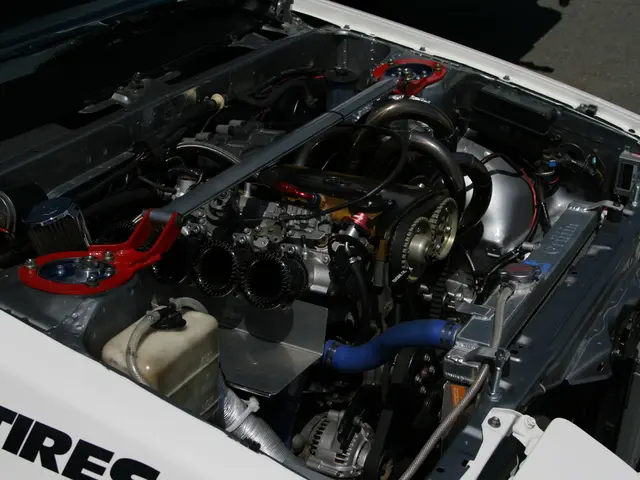Riding Green: Electric Taxis - Yay or Nay? Debunking Resistance to Eco-Friendly Cabs
Transitioning from diesel to electric: Challenges in embracing electric taxis - Diesel-powered taxis being replaced by electric ones: Understanding the skepticism surrounding e-taxis.
Let's face it, the future of taxis is upon us, especially in Hamburg. With a bold stance since this year, only eco-friendly cabs can now be registered in the city. But how does this fit in the wider landscape? Opinions among drivers differ, and conditions aren't always as rosy in places like Baden-Württemberg.
We break it down for you: What makes the eco-taxi model tick and why is there resistance?
In Hamburg, about 700 out of 3,000 cabs are fully electric, while there's a double-digit count of hydrogen ones. The city claims these numbers help slash tens of thousands of carbon dioxide emissions. Six dedicated fast charging stations with 12 charging points serve these eco-friendly rides at taxi stands.
While every new cab must be emission-free, the city offers a helping hand to taxi entrepreneurs for the switch. Older combustion engine taxis are still road-worthy. But the city encourages a transition to electric propulsion.
But what about Baden-Württemberg? Most of the 8,000 cabs operate on diesel or gasoline. To promote clean air, the green Ministry of Transport champions the switch and offers a 3,000-euro subsidy for each e-taxi. Freiburg considers this initiative a step forward but insists a budget boost is necessary.
Although a Hamburg-style commitment isn't in the cards for Baden-Württemberg, the ministry plans to swop ideas with cities intending to elevate their electric vehicle ratio through incentives. "We will assess its effectiveness," an official stated.
"I commend every taxi company offering climate-friendly mobility with an e-taxi," states Minister Winfried Hermann. For taxi drivers, city drives and charging downtime make e-cabs an attractive option.
What say the taxi drivers in the state? Thomas Laschuk, leader of the German Taxi Association in Baden-Württemberg, is unconvinced about the switch. He found the e-taxi he briefly owned impractical. "Passengers don't care about the electric car. They just want a clean car, decent service, and affordability," Laschuk opines.
The exposure seems to reflect sentiments among the roughly 3,700 taxi companies in the state, while Nuri Altun, chairman of the Baden-Württemberg Taxi Association, supports the shift as a contribution to climate improvement. Altun will soon get an e-car. By the end of the year, he foresees around 50-60 electric cabs operating in the state capital alone.
What's the hangup? Navigating the world of e-vehicles can be challenging for many taxi drivers. Despite his best efforts to persuade operators, Altun acknowledges, a lack of e-car info often wields considerable influence. In addition, poor charging infrastructure and shorter battery range fuel apprehension.
Laschuk reckons a diesel cab could cover 1000 km, while an electric one might struggle to reach Frankfurt Airport with only 150 km range under its belt. "Tell me I need to charge up for half an hour? The passengers will give me the cold shoulder," Laschuk laments, arguing that no number of charging stations can solve this problem for him.
Subsidies and charging infrastructure: While some cities like Stuttgart offer tax-exclusive, quick, and free charging stations for e-taxis, others like Karlsruhe and Freiburg rely on public charging stations. Expanding such facilities next to taxi stands in city centers is part of their approach to support e-mobility.
Incoming support from cities and national incentives like vehicle tax exemptions and new purchase incentives should eventually make e-taxis a more attractive choice for taxi operators. With ongoing efforts to improve charging infrastructure, the road ahead for eco-friendly cabs in Germany looks brighter than ever before.
- The employment policy in Hamburg has shifted towards eco-friendly taxis, with all new cabs required to be emission-free and a subsidy for the switch being offered.
- In contrast, Baden-Württemberg's employment policy regarding taxis is not as strict, with most cabs still operating on diesel or gasoline, but the Ministry of Transport has championed the switch and offers a subsidy for each e-taxi.
- Environmental-science advocates argue that the shift towards electric vehicles, including e-taxis, is crucial for addressing climate-change and reducing carbon dioxide emissions.
- Despite the subsidies and infrastructure support for e-taxis, resistance to the shift persists among some taxi drivers, who cite concerns about the vehicle's practicality, range, and charging time as reasons for their skepticism.







